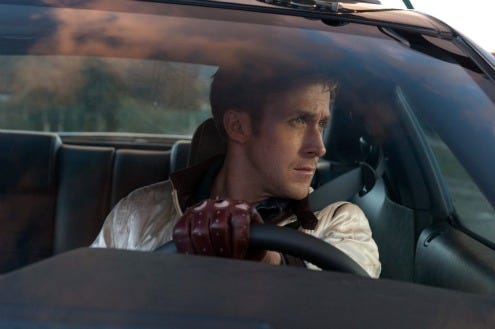Drive

"Drive" is a movie stuck out of time. For at least the first 30 minutes, I was convinced the story was set in the 1980s. The plethora of vintage cars, an '80s-ish soundtrack and the gold-on-white scorpion jacket worn by the main character seemed to spring forth from "Miami Vice" crossed with "Less Than Zero."
Even the titles are in neon-hued cursive.
But eventually the presence of cell phones and a late-model Mustang clue us in that the time is the present. Director Nicolas Winding Refn constructs a world in which eras meld into each other, so mobsters seemingly from the 1950s do not seem out of place.
Like "Valhalla Riding," Refn's last film, "Drive" is long on mood and sleek visuals, and the narrative seems merely a slender frame upon which to hang the director's highly stylized dressings. It's basically a tone poem set against the backdrop of a fairly standard crime-heist-gone-awry frame, punctuated by over-the-top violence that bursts a carefully cultivated bubble of serenity.
Ryan Gosling, as the never-named protagonist, utters very little dialogue. He's a mechanic who moonlights as a Hollywood stunt driver, and his other other job is wheelman for hire. He lays out the rules of his employment simply but with certainty: He will take his clients wherever they want to go and give them a five-minute window for whatever they need to do. He will carry no gun, and one tick on his watch after five minutes and he's gone.
The driver is very good behind the wheel of a car, of course, but we suspect there are others equally skilled. He also seems more than capable when a tussle is necessary, without knowing any fancy martial arts or hand-to-hand combat skills. No, the driver's main ability is to focus on whatever he's doing with a ferocious singularity, so that in that moment it is very hard for anyone to match against him.
Forty years ago, it's the sort of role Steve McQueen would've played.
Things seem to going well for the driver. He's got a good reputation on movie sets for getting the right crash shot without any wrinkles. And his boss at the garage, Shannon (Bryan Cranston), wants to set him up on the racing circuit with the backing of a benevolent local wiseguy named Bernie, played with chilling congeniality by funnyman Albert Brooks.
Then, at his new apartment, he bumps into neighbor Irene (Carey Mulligan), a single mother to young Benicio (Kaden Leos). Their courtship, if you can even call it that, is a series of long glances and shy exchanges of pleasantries. Somehow, with a few slo-mo shots and evocative performances by his two stars, director Refn manages to imply a depth of feeling that isn't written down on any page.
Then Irene's husband, Standard (Oscar Isaac), is released from prison, setting up a series of debacles that put everything at risk.
The driver's smooth mien begins to crack, as his entire life is a series of highly calculated risks. But this new chaos is something new and troubling to him. It's something he can't control, and that unnerves him.
Hossein Amini wrote the script for "Drive," based on the book by James Sallis and unread by me. Somehow, I suspect the text for this movie wouldn't have amounted to much without Refn's sumptuous, occasionally distracting style. It very much reminded me of the work of Michael Mann, whose visuals could overpower a bare-bones story. (Refn won the best director award at the 2011 Cannes Film Festival.)
But this is the sort of film that says much more than the scant spoken words of its anti-hero. Like the scorpion totem he wears on his back, the driver cannot deny the hardened core of his nature. That allows him to accomplish things few men can, but the cost is exacted in doors that are forever closed to him.
4 Yaps

